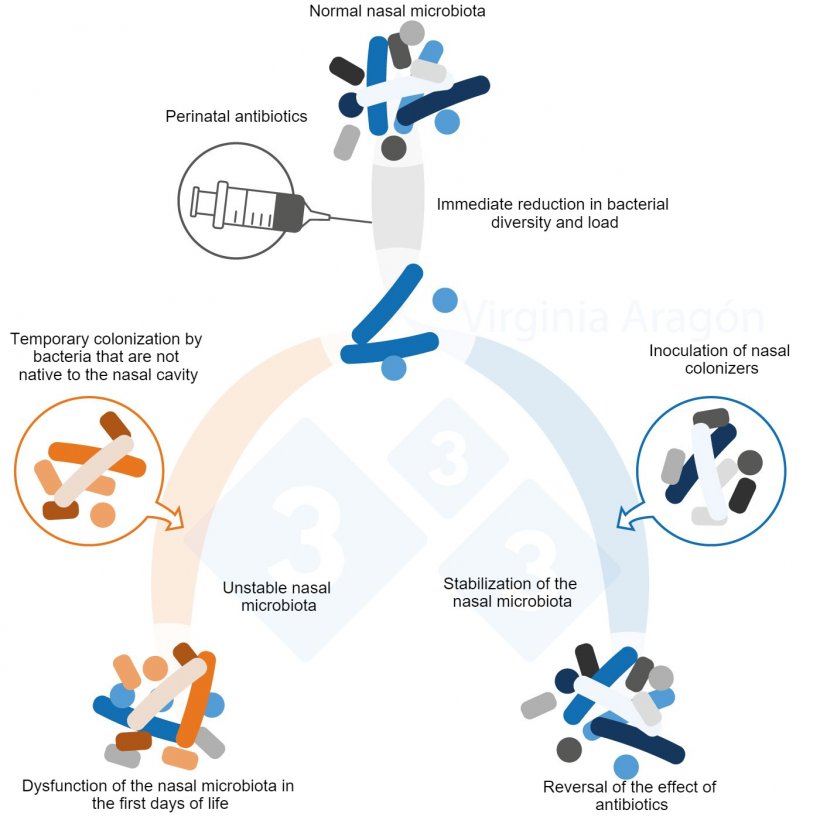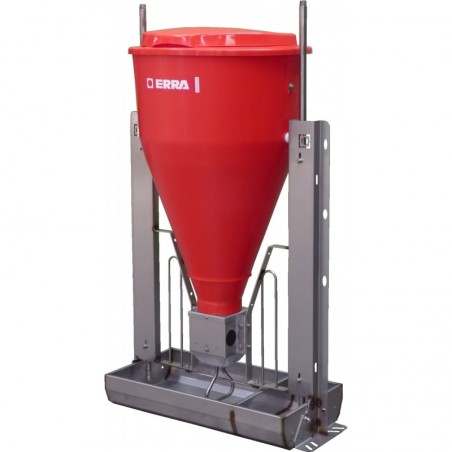The early years of an animal may be a determinant of its health for the rest of its life, as is the case in humans. Interventions to improve the piglets' condition will result in animals with fewer health problems and better production.
Microbiota: origen and function
Piglets, like other mammals, acquire the microbiota after birth. The microbiota plays a very relevant role in health through its involvement in the maturation of the immune system or in the exclusion of pathogens by competition. Thus, the diversity of the microbiota has been linked to the health of its hosts, and at the same time, dysbiosis has been associated with various diseases (Hou, 2022, Vientos-Plotts, 2023).

The most studied microbiota has been intestinal microbiota, but others, such as that of the nasal cavity, are also being studied. In fact, it has been observed that a nasal microbiota with low bacterial diversity at weaning increases the predisposition of weaned piglets to develop polyserositis caused by Glaesserella parasuis, Streptococcus suis, and Mycoplasma hyorhinis (Blanco-Fuertes 2021, Correa-Fiz 2016, Fredriksen, 2022). In healthy piglets, the most prevalent and/or abundant bacteria in the nasal cavity at weaning are Moraxella, Glaesserella, Streptococcus, Bergeyella, Lactobacillus, Mycoplasma, Neisseria, Rothia, and Prevotella.
Although it is not the only factor, contact with the mother is fundamental for the establishment of the piglets' nasal microbiota. Piglets that had no contact with their mothers (taken away at farrowing) or with limited contact (less than 12 hours) presented an altered microbiota, dominated by bacteria that are more characteristic of the fecal microbiota and not normally found abundantly in the nose of pigs, mainly from the orders Bacteroidales and Clostridiales (Obregon-Gutierrez, 2021 and 2023).
Contact with the sow had a greater effect than the environment in which the piglets were reared (Obregon-Gutierrez, 2021), although the environment can also affect the composition of the microbiota and the performance of the animals (Trudeau, 2023).
What are the side effects of medications? Medications and microbiota
Antibiotics have long been the preferred method for the control of bacterial infectious diseases, but we have seen regulatory changes that restrict their use due to the major problem of resistance to these compounds. In addition, the side effects of these medications on the beneficial bacteria of the microbiota can also be detrimental to animal health, as excessive antibiotic treatments can lead to dysbiosis.
This effect was clearly shown by Mark White (2014) in a clinical case where lameness and respiratory problems were observed, which were attempted to be controlled by medication at birth with long-acting amoxicillin at a high dose of approximately three times the recommended dose. Clinical problems were observed in the nursery (also medicated) and in some animals they did not resolve, with pleuritis and pericarditis lesions seen in the slaughterhouse. It was recommended to remove the medication at birth based on the potential effect that this high dose of antibiotic could have been having on the implantation of the microbiota, and clinical improvement was observed on the farm. Nasal samples from piglets on this farm after antibiotic removal showed that the nasal microbiota had a very high diversity compared to farms still using antibiotics at birth.
With the aim of demonstrating more directly the effect of perinatal antibiotics on nasal microbiota and subsequent piglet health, we conducted a study on two farms with polyserositis problems in the nursery that treated their piglets with antibiotics at birth and at one week of age. At weaning, nasal samples were taken from piglets before and after the treatments were removed, and an increase in nasal microbiota diversity was observed (Correa-Fiz, 2019). In addition, the elimination of medication in the farrowing room resulted in a clinical improvement in nursery piglets (lower mortality, cost of medications, and feed conversion ratio). Perinatal antibiotics were causing a reduction in diversity, which could be related to worse microbiota function, supporting the role of a diverse nasal microbiota in disease control.
The microbiota starts to establish after birth, so perinatal antibiotic interventions result in failure to establish a healthy microbiota early, delaying its establishment, or irreversibly affecting its composition.
On a farm with respiratory problems, treating newborn piglets or their dams a few days before farrowing with ceftiofur caused alterations in the nasal microbiota, including an unexpected increase in the diversity of the nasal microbiota when the piglets were one week old. This increased diversity which, far from reflecting a healthier microbiota, was due to a variety of environmental bacteria, whose presence in the nose can be considered an indication of dysbiosis (Blanco-Fuertes 2023). In contrast to the intestine, the nasal cavity is in direct contact with the exterior and environmental bacteria gained access to the mucosa, which was depopulated of the nose's own bacteria due to the antibiotic. (Figure 1) Although this colonization by environmental bacteria was temporary, when the piglets were three weeks old the composition of the nasal microbiota was still altered. The composition of the nasal microbiota of treated piglets returned to normal at the end of the nursery phase, but piglets born to treated dams suffered a longer-lasting alteration (Blanco-Fuertes 2023).

Figure 1. Perinatal antibiotics produce a reduction in the bacterial load of the nasal microbiota that alters its diversity and composition. This alteration lasts longer when the dams are treated. Inoculation of nasal colonizers can reverse this effect.
This alteration was able to be reversed by inoculating newborn piglets with nasal colonizers obtained from healthy piglets. In addition, this inoculation produced a reduction in clinical signs (mainly lameness) at the nursery phase, possibly due to a reduction in the transmission of bacteria (including pathogens) from dams that are replaced by the inoculation of normal, potentially beneficial members of the nasal microbiota (Blanco-Fuertes 2023). Also the strategy of administering antibiotic treatments to dams also appears to be linked to a greater number of resistant bacteria that are transmitted to piglets, and therefore its necessity should be assessed.
In summary, antibiotics are a double-edged sword and can negatively affect the microbiota. The nasal microbiota and its manipulation open up options to support piglet health, and the protection of overall health.









